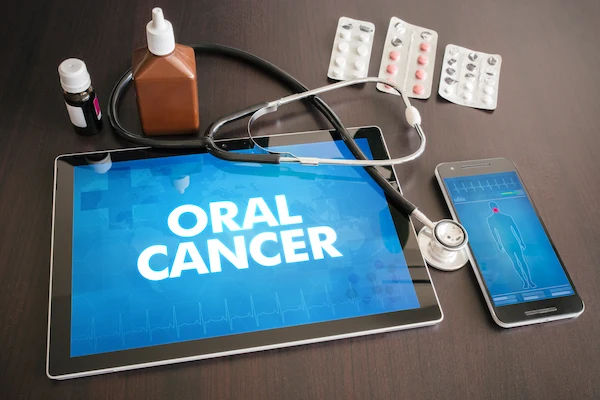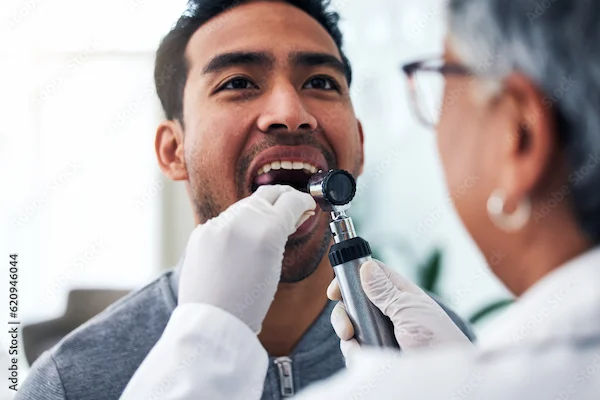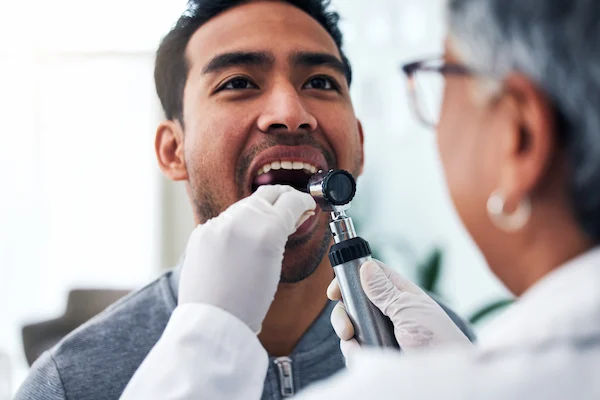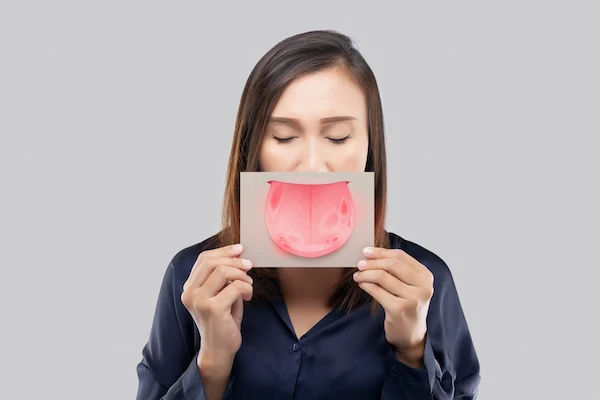Signs Of Oral Cavity Cancer
Don't ignore the signs of oral cancer. Learn to recognize the 7 most common symptoms, understand key risk factors, and find out how early detection can save your life.

Written by Dr. Siri Nallapu
Reviewed by Dr. Shaik Abdul Kalam MD (Physician)
Last updated on 13th Jan, 2026

Your mouth is a window to your overall health, and sometimes, it sends crucial warning signals that shouldn't be ignored. Oral cavity cancer, which includes cancers of the lips, tongue, cheeks, floor of the mouth, hard palate, and gums, is a serious condition where early detection dramatically improves outcomes. Surprisingly, many people dismiss the early signs as minor dental issues. This article will guide you through the seven most common symptoms of oral cancer, explain the key risk factors, and outline the critical steps to take if you notice anything unusual. Knowing these signs empowers you to take action, potentially saving your life.
What is Oral Cavity Cancer?
Oral cavity cancer refers to the uncontrolled growth of cells that invade and cause damage to surrounding tissues in the mouth. It falls under the broader category of head and neck cancers. The vast majority of oral cancers are squamous cell carcinomas, meaning they begin in the flat, thin cells (squamous cells) that line the inside of your mouth and throat.
Understanding the Oral Cavity
The oral cavity isn't just your teeth. It's a complex area that includes:
- Lips
- Tongue (front two-thirds)
- Inner lining of the cheeks (buccal mucosa)
- Gums (gingiva)
- Floor of the mouth (under the tongue)
- Hard palate (roof of the mouth)
- Area behind the wisdom teeth (retromolar trigone)
Cancer can develop in any of these areas, which is why a thorough self-exam is important.
The 7 Most Common Signs of Oral Cancer
Being able to recognize the early warning signs is your first line of defense. If any of the following symptoms of throat and mouth cancer persist for more than two weeks, it is essential to get them checked by a professional.
1. Sores That Don't Heal
The most common sign is an ulcer or sore in the mouth that does not heal within two weeks. Unlike common canker sores, which are painful initially and then heal, cancerous sores often persist and may even bleed easily.
2. Patches in the Mouth: Leukoplakia and Erythroplakia
- Leukoplakia: A white or grayish patch that cannot be scraped off. While often benign, some can show early signs of cancer.
- Erythroplakia: A red, velvety patch that is much more likely to be cancerous or precancerous. Any white patch on gum that won't go away or a red patch should be evaluated immediately.
3. Lumps, Thickening, or Rough Spots
A lump, bump, or thickened area in the cheek, on the lip, or elsewhere in the mouth that you can feel with your tongue is a cause for concern. This could also manifest as a rough or crusty spot, particularly on the lip.
4. Unexplained Numbness or Pain
Unexplained numbness, loss of feeling, or tenderness in any area of the mouth, face, or neck can be a sign that nerves are being affected by a growing tumor.
5. Persistent Sore Throat or Hoarseness
A sore throat that doesn't go away, a feeling of chronic irritation, or a noticeable change in your voice, such as
hoarseness, can indicate cancer in the throat or voice box.
6. Difficulty Chewing and Swallowing
Cancer can make it difficult or painful to chew, swallow, or move your jaw and tongue. You might feel like food is
getting stuck in your throat.
7. A Feeling That Something Is Caught in the Throat
The persistent sensation of having something lodged in the back of your throat is a classic symptom that should never be ignored.
Less Common But Important Symptoms
While the above signs are primary, other symptoms can also point to advanced oral cancer:
- Ear Pain: Pain in one ear without hearing loss can be referred pain from a cancer deep within the oral cavity or throat.
- Dramatic Weight Loss: Significant, unintentional weight loss is often a sign of many cancers, including oral cancer.
- Loose Teeth: If teeth become loose for no apparent dental reason, it could be due to a tumor affecting the jawbone or tooth sockets.
Key Risk Factors for Oral Cavity Cancer
Understanding what increases your risk can help in prevention and early screening.
Tobacco Use: The Primary Culprit
Whether smoked (cigarettes, cigars, pipes) or smokeless (chewing tobacco, snuff), tobacco use is the single largest risk factor, responsible for a vast majority of cases. The carcinogens in tobacco directly damage cells in the mouth.
Heavy Alcohol Consumption
Heavy, chronic alcohol use significantly increases risk. When combined with tobacco, the risk multiplies—these two factors are synergistic.
Human Papillomavirus (HPV)
Infection with certain high-risk strains of HPV, particularly HPV16, is a rapidly growing cause of oropharyngeal
cancers (the very back of the tongue and the tonsils). The link between HPV and oral cancer symptoms is well-
established.
Other Risk Factors
These include excessive sun exposure to the lips, a diet low in fruits and vegetables, a weakened immune system, and age (most common in people over 40).
What to Do If You Notice a Sign
The Two-Week Rule
Do not panic if you see something. Many benign conditions mimic early cancer. The general rule is to monitor the
symptom. If it has not resolved on its own within two weeks, you must seek professional evaluation.
Who to See: Dentist vs. Doctor
Your dentist is often the first line of defense, as they are trained to screen for oral cancer during routine check-ups. You can also consult your primary care physician. For a definitive diagnosis, you will likely be referred to an oral surgeon or an otolaryngologist (ENT specialist).
Diagnosis: The Steps to Confirmation
Physical and Visual Examination
A doctor will examine your mouth, throat, and neck, feeling for any lumps or abnormalities.
Biopsy: The Definitive Test
If a suspicious area is found, a biopsy is performed. A small sample of tissue is removed and sent to a pathologist to check for cancerous cells. This is the only way to confirm a diagnosis.
Imaging Tests
If cancer is confirmed, imaging tests like CT, MRI, or PET scans are used to determine the stage of the cancer—how deep it is and if it has spread (metastasized) to lymph nodes or other parts of the body.
Prevention is Your Best Defense
Lifestyle Modifications
- Don't use tobacco in any form.
- Limit alcohol consumption.
- Protect your lips from the sun with a UV-A/B-blocking lip balm and a hat.
- Eat a healthy diet rich in antioxidants from fruits and vegetables.
- Get vaccinated against HPV.
The Role of Regular Dental Check-ups
Your biannual dental cleaning is more than just about cavities. Dentists perform a visual oral cancer screening at every check-up. This regular professional scrutiny is a powerful tool for catching abnormalities early.
Conclusion
Recognising the signs of oral cavity cancer is a crucial piece of personal healthcare. While the symptoms can be subtle and easily mistaken for minor issues, the "two-week rule" provides a clear guideline for action. Do not let fear or hesitation prevent you from seeking help. The prognosis for oral cancer caught in its early stages is significantly better than when it is advanced. Empower yourself with this knowledge, perform periodic self-exams, maintain your regular dental appointments, and make healthy lifestyle choices to reduce your risk. Your health is in your hands—be proactive and vigilant.
Consult Top Specialists
Consult Top Specialists

Dr Gaurav Jain
Oral and Maxillofacial Surgeon
21 Years • BDS, MDS
Delhi
Apollo Hospitals Indraprastha, Delhi

Dr. Sanjna Nayar
Dentist
33 Years • BDS,MDS-Prosthodontics & Implantology, PhD - Dental Implantology, Master in Prosthetic Section Implants ICOI USA, Fellow in Implantology ICOI USA
Delhi
Apollo Hospitals Indraprastha, Delhi
(25+ Patients)

Dr. Sailendra Das
Oral and Maxillofacial Surgeon
13 Years • BDS
Guwahati
Apollo Excelcare Hospital, Guwahati

Dr. Aritra Mandal
Dentist
6 Years • BDS, MDS (PERIODONTOLOGY)
Kolkata
COSMI DENTAL, Kolkata
Dr. Menaka Venkatesh
Dentist
16 Years • BDS
Vellore
Krishnadentistry, Vellore
More articles from Oral Cancer
Frequently Asked Questions
1. What is the difference between a canker sore and oral cancer?
Canker sores are usually painful from the start and heal completely within 10-14 days. Oral cancer sores often are not painful initially (until advanced) and persist for more than two weeks without healing.
2. Can young, healthy people get oral cancer?
While risk increases with age, HPV-related oral cancers are being diagnosed in younger, non-smoking individuals. No one is completely without risk.
3. Is oral cancer curable?
When detected early, oral cancer has a high cure rate. Treatment is most successful before the cancer has spread to lymph nodes or other parts of the body.
4. How can I perform a self-exam for oral cancer?
In a well-lit room, use a mirror to look and feel your lips, gums, cheeks, roof and floor of your mouth, and tongue. Check for any color changes, lumps, sores, or patches.
5. Does getting an HPV vaccine protect against oral cancer?
The HPV vaccine is designed to protect against the strains of the virus most commonly linked to cervical and oropharyngeal cancers. Getting vaccinated is a strong preventive measure.


_0.webp)

